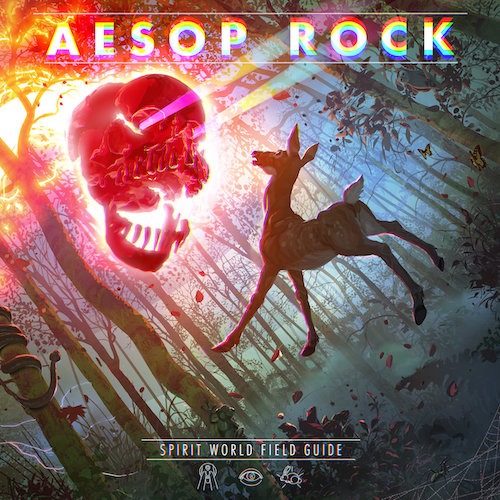Aesop Rock is no stranger to being conceptual. The Long Island wordsmith has spent his whole career weaving seemingly stream-of-consciousness words and imagery into a lyrical hodgepodge that nonetheless has meaning, if it can’t be immediately gleaned. Meaning is something that’s on most people’s minds, more so in this year of vast uncertainty, 2020. Most people are looking for it, but haven’t found it. Enter Aesop Rock’s “Spirit World Field Guide“. The concept is Aes providing the listeners with his own experiences and themes to help them navigate through an unexplored territory. True to its title, the album itself was even promoted as a field guide, with camping equipment being sold with it as accessories. Produced almost entirely by Aesop Rock himself, the music is reminiscent of the kind used in the Netflix series “Stranger Things”, giving it a synth-heavy, ominous, nostalgia to it. While I don’t consider this his best work, the challenge of Aesop Rock’s music and lyrical content is one that this listener is always up for.
The album starts off with “Hello From The Spirit World”, a verbal welcome to the Spirit World and instructions for getting through it. The line Aesop says about how “users should skip to whatever section most directly applies to their impending scenario” clearly indicates a “choose-your-own-adventure” aspect to the concept. The first single and official song of the album is “The Gates.” It’s bouncy with plenty of synths, like a video game. Lyrically, Aes makes use of lots of animal imagery, as though this is what he sees at first glance in the Spirit World. “Button Masher” has some trippy guitar chords to go with the blast-off psychedelia of the lyrics. The track “Dog At The Door” is a shift in production: It’s bass-driven, has very little percussion, and more to do with Aesop Rock’s paranoia. The lyrics are relatable if you’ve ever checked something outside at night that wasn’t actually out there. On the punk-influenced “Gauze”, Aes raps as frantic as the pace of the drums. Unlike the intro track, this track is more like a warning as opposed to the former’s welcome. “Crystal Sword” has a synth-funk sound to it, with Aes showing that he hasn’t been one to shy away from his anxieties on wax: “Me, I done a lot of both, riding out and running scared/ I’m everything from, ‘He’s a pest,’ to, ‘He’s been dead for twenty years'”. Aes has made several tracks about his world travels. “Pizza Alley”, the second single, is about his trip to Peru. By the 2:05 mark, the heavy lo-fi drum snares drop. This is the first time I found myself nodding my head to a beat on the album, and the lyrics were detailed and abstract all at once:
His experiences in the Spirit World varied from bored to pleasant, from creative to nightmarish. The track “Boot Soup” fits the former assessment. “Coveralls” is the one track that sounds like it’s street. It’s got smashing snares and an urban paranoia feel to with the line “I see animals exhibiting irregular behavior.” Many of the beats sound as though they were sampled from an arcade game’s score, which makes sense considering the arcade references Aes has made over the years. On “Jumping Coffin”, he makes a funny “Ghostbusters” refence in connection to the album’s theme/title. “Holy Waterfall” is another track about his world travels, this time about his trip to Cambodia. Compressed into under 4-minutes, it’s just as detailed as “Pizza Alley” and has a synth coda that sounds like a fly buzzing.
Speaking of which “Flies” is the shortest track at 46 seconds. It shows that he can translate humorous everyday occurrences into brief tracks, this one’s about Aes being annoyed by some bothersome fruit flies. “Salt” has DJ scratches and drums which sound of boom-bap, while “Sleeper Car” parallels “Getaway Car” from his 2007 album “None Shall Pass”. This was the one track that Aesop Rock wasn’t behind the boards for. Produced by Hanni El Khatib & Leon Michaels, this one has piano riffs in place of synths and is about his trip in Thailand.
More humorous tracks included “1 to 10”. Also very short (at 56 seconds), this one’s a track about Aesop’s back pain. “Attaboy” is directly about the spirit world, with a female voice at the beginning saying there’s different levels to the world. Lyrically, Aes spits a first-person narrative about terrorizing this world, like the monster of the Upside-Down in “Stranger Things.” One of the most off-kilter tracks on the album is “Side Quest”. Though the lyrics concern skateboarding at night, the beat just makes Aesop’s flow somewhat off. Aes is alone in his head with ideas constantly crashing into each other and on “Kodokushi” (from the Japanese meaning “lonely death”), he wonders if he’ll suffer exactly that. The short & boring “Fixed and Dilated”, “Marble Cake”, and the funky, live instrument helmed “The Four Winds” close out the album.
Considering how much of a wild world 2020 has been, it’s not a stretch to imagine this album being used to navigate as best as one can through the chaos. For Aesop Rock himself, birthing this album is a personal outlet. His 2016 album, “The Impossible Kid“, was made during a period of self-induced isolation. “Spirit World Field Guide” was made during a period of, for the most part, legally mandated isolation. Different circumstances, but the solitude is the same. While I maintain that it’s not his best work, it’s certainly creative conceptually and is rewarding.

